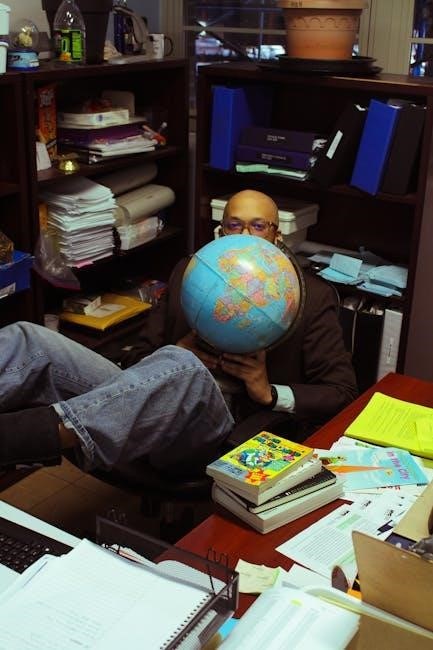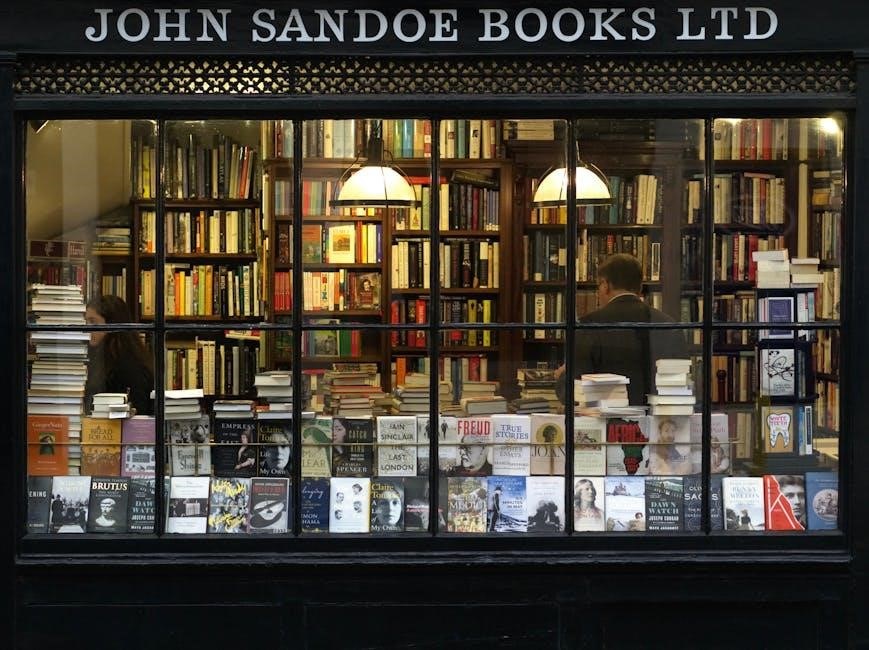The Great Books of the Western World is a 54-volume set compiled by Robert Maynard Hutchins and Mortimer Adler‚ featuring influential works in literature‚ philosophy‚ and science.
1.1 Overview of the Collection
The Great Books of the Western World is a comprehensive 54-volume collection of influential works spanning literature‚ philosophy‚ and science. It includes masterpieces by authors like Shakespeare‚ Dante‚ and Homer‚ as well as 20th-century thinkers such as William James and Bertrand Russell. Compiled by Robert Hutchins and Mortimer Adler‚ the set aims to capture the essence of Western intellectual heritage. The collection is now available in PDF format‚ with initiatives like the Encyclopedia Britannica and the University of Chicago supporting its digital preservation. Patrons can access these works through open-source platforms‚ ensuring free and unrestricted availability for scholarly and personal use. This digital archive remains a vital resource for exploring Western civilization’s most enduring ideas.
1.2 Purpose and Vision Behind the Series
The Great Books of the Western World series was envisioned to preserve and promote the intellectual heritage of Western civilization. Compiled by Robert Maynard Hutchins and Mortimer Adler‚ the collection aimed to provide a comprehensive library of foundational works that shaped Western thought. The vision was to make these timeless works accessible to a broader audience‚ fostering a deeper understanding of literature‚ philosophy‚ and science. By curating these texts‚ the series sought to inspire critical thinking‚ intellectual growth‚ and a shared appreciation for the ideas that have defined Western culture. This endeavor aligns with the ideals of liberal education‚ emphasizing the importance of these works in shaping modern thought and society.

Historical Context and Development
The Great Books of the Western World were compiled in the mid-20th century by Encyclopedia Britannica and the University of Chicago‚ led by Robert Hutchins and Mortimer Adler. This collection aimed to preserve the foundational works of Western literature‚ philosophy‚ and science‚ including influential texts from the 20th century.

2.1 The Role of Encyclopedia Britannica and the University of Chicago
The Great Books of the Western World was a collaboration between Encyclopedia Britannica and the University of Chicago‚ led by Robert Maynard Hutchins. This project aimed to compile and publish the most influential works of Western civilization‚ spanning literature‚ philosophy‚ and science. The collection is based on Encyclopedia Britannica’s Great Works series and includes 54 volumes. The University of Chicago played a pivotal role in curating and organizing the content‚ ensuring the inclusion of seminal texts that shaped Western thought. This collaboration reflects their shared mission to preserve and disseminate knowledge‚ making these works accessible to a broader audience. The collection was digitized in 2020‚ offering free access to these timeless works.
2.2 Key Figures: Robert Maynard Hutchins and Mortimer Adler
Robert Maynard Hutchins‚ president of the University of Chicago‚ and philosopher Mortimer Adler were instrumental in compiling the Great Books of the Western World. Hutchins championed the project‚ envisioning it as a cornerstone of liberal education‚ while Adler contributed his philosophical expertise. Together‚ they curated a 54-volume set‚ ensuring the inclusion of seminal works from Western civilization. Their collaboration extended to adding 20th-century material‚ including works by William James‚ Bertrand Russell‚ and others. Both figures were committed to making these works accessible‚ reflecting their belief in the enduring relevance of classical ideas in modern education. Their efforts laid the foundation for the Great Books Movement‚ emphasizing the importance of these texts in shaping intellectual thought.

Structure and Content of the Collection
The Great Books of the Western World is a 54-volume set‚ featuring classic and modern works spanning literature‚ philosophy‚ and science‚ from ancient to 20th-century authors.
3.1 The 54-Volume Set: Breakdown and Organization
The Great Books of the Western World is a meticulously organized 54-volume collection‚ spanning from ancient to modern works. It is divided into categories such as literature‚ philosophy‚ and science‚ ensuring a comprehensive representation of Western intellectual heritage. The series begins with works from ancient Greece and Rome‚ progressing through the Middle Ages‚ Renaissance‚ and Enlightenment‚ up to the 20th century. Each volume is dedicated to a specific author or thematic area‚ with works like Homer’s Iliad‚ Shakespeare’s plays‚ and Plato’s dialogues. The collection also includes a two-volume index and a syllabus‚ providing readers with a structured approach to understanding the material.
3.2 Major Categories: Literature‚ Philosophy‚ and Science
The Great Books of the Western World is divided into three primary categories: Literature‚ Philosophy‚ and Science. Literature includes works by iconic authors such as Homer‚ Shakespeare‚ and Dante‚ showcasing the evolution of storytelling and poetry. Philosophy features foundational texts by thinkers like Plato‚ Aristotle‚ and Kant‚ exploring metaphysics‚ ethics‚ and logic. Science encompasses writings by pioneers such as Copernicus‚ Newton‚ and Darwin‚ tracing the development of scientific inquiry. These categories provide a holistic view of Western intellectual history‚ allowing readers to engage with diverse perspectives and ideas that have shaped civilization. The collection’s organization reflects its aim to foster a well-rounded understanding of human knowledge.
Key Authors and Their Contributions
The collection features iconic authors like Homer‚ Sophocles‚ Plato‚ Aristotle‚ Shakespeare‚ and Dante‚ whose works laid the foundation of Western literature and philosophy‚ shaping enduring ideas.
4.1 Classical Thinkers: Plato‚ Aristotle‚ and Others
The Great Books of the Western World include the works of classical thinkers like Plato and Aristotle‚ central to Western philosophy. Plato’s dialogues‚ such as The Republic‚ explore justice and the ideal state‚ while his theory of forms laid the groundwork for metaphysics. Aristotle’s writings span ethics‚ metaphysics‚ and biology‚ establishing foundational knowledge across various fields. Their ideas remain influential in contemporary thought‚ shaping debates in philosophy‚ science‚ and ethics. Other classical authors‚ including Homer‚ Sophocles‚ and Euripides‚ are also featured‚ offering insights into ancient Greek literature and its lasting impact on Western culture and intellectual traditions today.
4.2 Influential Writers: Shakespeare‚ Dante‚ and Homer
The Great Books of the Western World prominently feature works by Shakespeare‚ Dante‚ and Homer‚ whose writings profoundly shaped Western literature. Shakespeare’s plays and sonnets‚ such as Romeo and Juliet and Hamlet‚ explore human nature‚ morality‚ and emotion with unparalleled depth. Dante’s Divine Comedy is a cornerstone of Italian literature‚ offering a poetic journey through sin‚ redemption‚ and divine love. Homer’s Iliad and Odyssey are foundational epics that define heroism and the human condition. These authors’ works have endured for centuries‚ influencing countless writers and thinkers. Their inclusion in the Great Books underscores their lasting impact on the literary and intellectual heritage of the West.

The Impact on Education and Intellectual Thought
The Great Books of the Western World transformed education by emphasizing original texts and fostering critical thinking‚ shaping the Western intellectual tradition and promoting a well-rounded understanding of civilization.
5.1 The Great Books Movement and Liberal Education
The Great Books Movement‚ championed by thinkers like Mortimer Adler and Robert Maynard Hutchins‚ sought to revitalize education through direct engagement with foundational texts. By emphasizing discussion and critical thinking‚ it aimed to cultivate a well-rounded intellectual framework. The availability of these works in PDF formats has enhanced accessibility‚ allowing broader audiences to participate in liberal education. This approach encourages readers to explore diverse perspectives across literature‚ philosophy‚ and science‚ fostering a deeper understanding of Western civilization. The movement’s emphasis on primary sources aligns with the Great Books of the Western World’s mission‚ ensuring that essential ideas remain central to educational pursuits.
5.2 How the Series Shaped Western Intellectual Tradition
The Great Books of the Western World series has profoundly shaped Western intellectual tradition by providing a comprehensive repository of foundational texts. It bridges the gap between ancient and modern thought‚ connecting readers to seminal ideas in philosophy‚ literature‚ and science. By curating works from Plato to Freud‚ the series offers a cohesive narrative of intellectual development. Its emphasis on primary sources has influenced educational curricula and scholarly discourse‚ fostering a deeper understanding of Western civilization’s evolution. The availability of these texts in PDF formats has further cemented their accessibility‚ ensuring their continued relevance in shaping contemporary thought and intellectual inquiry.

The 20th-Century Additions
The series expanded to include 20th-century thinkers‚ incorporating works by William James‚ Bertrand Russell‚ and others‚ enriching the collection with modern philosophical and scientific perspectives.
6.1 Modern Philosophers: William James‚ Bertrand Russell‚ and More
‚ shaping modern intellectual discourse. These thinkers‚ along with others‚ enriched the collection with contemporary ideas‚ bridging classical thought with modern inquiry. Their inclusion reflects the series’ commitment to capturing the evolution of Western philosophy and its relevance in the 20th century.
6.2 Scientific and Philosophical Works of the 20th Century

The 20th-century additions to the Great Books of the Western World include seminal works by scientists and philosophers who shaped modern thought. Figures like Albert Einstein‚ with his groundbreaking theories on relativity‚ and Niels Bohr‚ a pioneer in quantum mechanics‚ are represented. Philosophers such as Karl Popper and Ludwig Wittgenstein contributed foundational texts on the philosophy of science and language. These works reflect the intersection of scientific discovery and philosophical inquiry‚ offering insights into the intellectual advancements of the 20th century. The inclusion of these writings underscores the series’ commitment to documenting the evolution of human knowledge and its relevance in shaping contemporary understanding.

Digital Availability and PDF Versions
The Great Books of the Western World are now widely available in digital formats‚ including PDF versions‚ enabling easy access for modern readers and scholars.
7.1 Open Source and Free Access Initiatives
The Great Books of the Western World are increasingly accessible through open-source platforms and free access initiatives. These efforts aim to democratize knowledge by providing digital versions of the collection. Many non-profit organizations and educational institutions have digitized the texts‚ making them available for download in PDF format. Platforms like Project Gutenberg and the Internet Archive host portions of the series‚ enabling readers worldwide to engage with these foundational works. Such initiatives not only preserve the texts but also ensure their relevance in the digital age‚ fostering a broader understanding of Western intellectual heritage. These resources are particularly valuable for students and scholars with limited access to physical copies.
7.2 Downloading the Collection: Options and Resources
Downloading the Great Books of the Western World in PDF format is facilitated by various online platforms and repositories. The University of Chicago and the Great Books Foundation offer digital versions for purchase‚ while sites like Google Books and the Internet Archive provide partial access to select volumes. Additionally‚ online archives such as LibGen and PDF Drive host downloadable versions‚ though users should exercise caution regarding copyright compliance. Academic repositories and libraries often include these texts in their collections‚ accessible through institutional subscriptions. For those seeking convenience‚ third-party websites and forums may offer direct links to the complete set‚ though verifying the legality and quality of these sources is essential.

Preservation and Modern Relevance
The Great Books endure as foundational texts‚ preserving Western cultural heritage and fostering critical thinking in modern education‚ remaining indispensable for understanding intellectual history and its relevance today.
8.1 Efforts to Digitize and Preserve the Collection
Significant efforts have been made to digitize the Great Books of the Western World‚ ensuring their preservation for future generations. Institutions and digital archives have initiated projects to scan and convert the physical volumes into PDF formats‚ maintaining the original content’s integrity. This process involves careful handling of fragile books‚ advanced scanning technologies‚ and quality control measures to ensure accuracy. Additionally‚ collaborative efforts between libraries‚ academic institutions‚ and preservation organizations have facilitated the creation of digital repositories. These initiatives not only safeguard the collection from physical degradation but also enhance accessibility‚ allowing scholars and readers worldwide to engage with these seminal works. Preservation in digital form ensures that the Great Books remain a vital resource in the digital age.
8.2 The Importance of the Great Books in the Digital Age
The Great Books of the Western World remain profoundly relevant in the digital age‚ offering timeless insights into human knowledge and culture. Their digitization in PDF format has broadened accessibility‚ enabling global readers to explore foundational texts without physical constraints. These works‚ spanning literature‚ philosophy‚ and science‚ provide a framework for understanding the evolution of Western thought. In an era dominated by rapid information exchange‚ the Great Books serve as a cornerstone for critical thinking and intellectual engagement. Their digital preservation ensures that future generations can draw from this rich repository of ideas‚ fostering a continued dialogue with the past while addressing contemporary challenges.
The Great Books of the Western World PDF collection remains a cornerstone of Western intellectual heritage‚ offering profound insights into human thought and culture. Its enduring relevance ensures continued inspiration and education for future generations.
9.1 The Enduring Legacy of the Great Books
The Great Books of the Western World PDF collection has left an indelible mark on intellectual history‚ shaping education and fostering critical thinking. These works‚ spanning literature‚ philosophy‚ and science‚ encapsulate the evolution of Western thought. From Plato to Shakespeare‚ they preserve timeless ideas that continue to inspire. The series has influenced liberal arts education‚ emphasizing the importance of primary sources. Its legacy endures through digital accessibility‚ ensuring future generations can engage with these foundational texts. The Great Books Movement‚ rooted in these volumes‚ remains a testament to their profound impact on intellectual and cultural development.
9.2 Final Thoughts on Their Significance
The Great Books of the Western World PDF stands as a cornerstone of intellectual heritage‚ offering unparalleled insight into the development of Western thought. These works collectively represent the most profound ideas in literature‚ philosophy‚ and science‚ providing a foundation for understanding human civilization. Their significance lies in their ability to challenge readers to engage with timeless questions and principles. In an age of rapid information exchange‚ these texts remind us of the enduring value of deep‚ reflective learning. By preserving and sharing these works in accessible formats‚ we ensure their relevance for future generations. The Great Books remain essential for anyone seeking to explore the roots of our cultural and intellectual landscape.

Bibliography and Further Reading
For further exploration of the Great Books of the Western World PDF‚ consult the official Encyclopedia Britannica website‚ online archives‚ and libraries offering free digital access.
10.1 Recommended Resources for Deeper Exploration
For a deeper dive into the Great Books of the Western World PDF‚ explore the official Encyclopedia Britannica archives‚ which provide comprehensive access to the series. Additionally‚ academic databases like JSTOR and Google Scholar offer scholarly articles and essays analyzing the works. The Internet Archive and Project Gutenberg are excellent sources for free‚ downloadable versions of many classic texts. University libraries often host digitized collections‚ and platforms like HathiTrust Digital Library offer extensive resources. For modern readers‚ the ‘Great Books of the Western World: 54 Volume Set’ remains a cornerstone‚ while newer editions and companion guides‚ such as the ‘Syntopicon‚’ enhance understanding. These resources collectively provide a rich foundation for exploring the Great Books in depth.
10.2 Suggested Links for Additional Study
For further exploration of the Great Books of the Western World PDF‚ visit the Internet Archive (archive.org) and Google Books (books.google.com)‚ which offer free access to many classic texts. The University of Chicago’s website provides insights into the series’ origins. Additionally‚ explore the HathiTrust Digital Library (hathitrust.org) and Project Gutenberg (gutenberg.org) for downloadable PDFs. Many university libraries also provide digitized versions through their online portals. These resources are invaluable for in-depth study and complement the physical collection. Engage with forums like Reddit’s r/GreatBooks for discussions and shared resources‚ enhancing your journey through the Great Books.